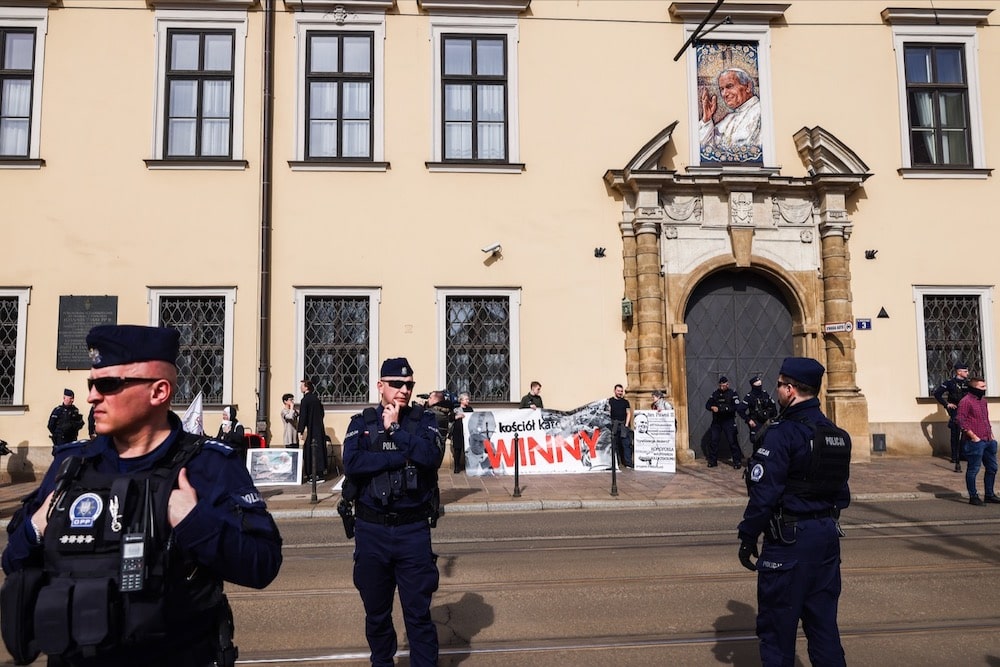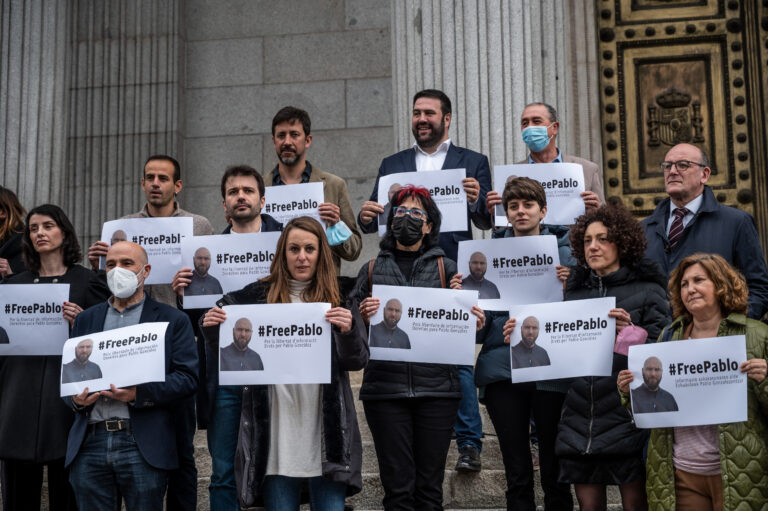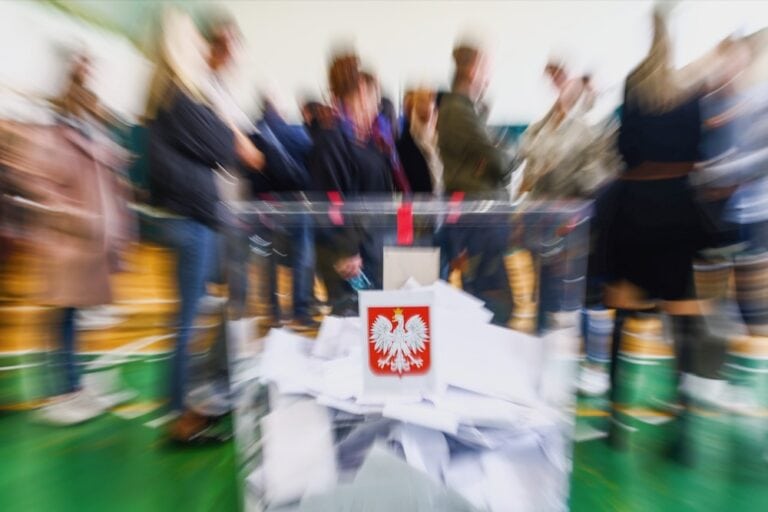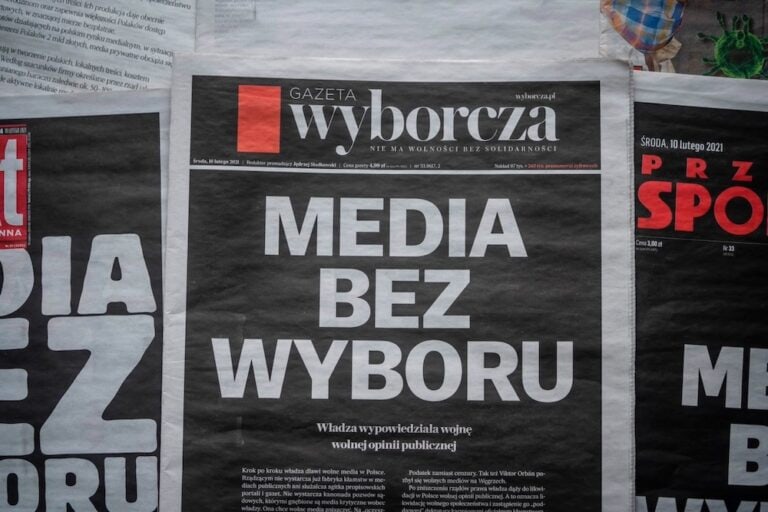Political attacks, regulatory investigations and bill to amplify state propaganda channels fire starting gun on pre-election pressure.
This statement was originally published on ipi.media on 23 March 2023.
Political attacks, regulatory investigations and bill to amplify state propaganda channels fire starting gun on pre-election pressure
Poland’s government and its allies have begun dialing up political and regulatory pressure on critical and independent media in the build up to this year’s autumn parliamentary elections, the International Press Institute (IPI) warned today.
While Poland’s media landscape remains vibrant and pluralistic overall, in recent years independent media critical of the ruling Law and Justice (PiS) party have faced a multi-pronged campaign of regulatory, financial and legislative pressure aimed at undermining their influence.
Ahead of parliamentary elections expected in autumn 2023, PiS and its allies have in recent months begun to tighten the screws further in an attempt to muzzle critical journalism and brought forward plans to amplify the reach of state propaganda channels at the expense of independent broadcasters.
In recent weeks, an investigative documentary broadcasted by liberal station TVN24, which included claims of the negligence by the former Polish pope regarding child sexual assault allegations, has emerged as the latest flashpoint in this campaign of pressure.
“As Poland’s autumn election approaches, recent political attacks and politically motivated regulatory investigations against TVN and other media over their reporting have fired the starting gun on what we fear will be further pressure against critical and independent media in the run up to the vote,” IPI Deputy Director Scott Griffen said. “In previous years, pre-election periods have been marked with similar efforts by the ruling party to restrict the flow of information and undermine critical media voices. IPI urges the PiS government to respect press freedom and will closely monitor the situation to report any violations to relevant European and international institutions.”
Renewed attacks on TVN
Renewed political attacks were aimed at broadcaster TVN on March 9, after its flagship news channel TVN24 aired a documentary with claims that the late Pope John Paul II had been aware of cases of paedophilia in the Polish Catholic Church but had failed to act to tackle the allegations. The documentary by TVN, which is owned by U.S.-based media giant Discovery, divided opinion in Poland and angered PiS’s overwhelmingly Catholic voter base.
In response, the Polish foreign ministry discredited TVN’s report, claiming that it was part of a “hybrid war aimed at creating divisions and tensions in the Polish society”, and summoned the U.S. ambassador in a symbolic move. Government-controlled public media also denounced TVN and smeared the investigative documentary.
PiS ally Maciej Świrski, who heads the broadcast media regulator KRRiT, which has long been controlled by figures appointed by the PiS government, then initiated regulatory proceedings against TVN over the report. This followed an official complaint to KRRiT by the ruling party’s general secretary Krzysztof Sobolewski over what he claimed was TVN’s “libel.”
In recent years, TVN has faced repeated verbal attacks from PiS politicians, regulatory investigations and determined efforts by the government to pass targeted legislation which would have sliced through the network’s ownership structure. This exposed TVN to greater instability, while legislation on ownership would have forced its sale. Overt legislative attempts to interfere with foreign-owned media and “repolonise” the market have subsided for now, but TVN has continued to face pressure, as IPI documented.
TVN was not the only media outlet to face pressure over its journalism on the papal story. On March 14, state-controlled oil giant PKN Orlen announced it would temporarily cease the sale of left-wing satirical weekly magazine Nie in all kiosks, newsagents and petrol stations it owns after the media released a critical front page addressing the alleged actions of the former pope.
The CEO of PKN Orlen, Daniel Obajtek, a close ally of PiS leadership, announced that his company, which owns the press distributor Ruch, would be withdrawing the edition of the magazine due to what it unduly claimed was “hate speech”.
On March 13, state-owned post office Poczta Polska was also accused of censorship after it withdrew the magazine from sale. Critics said the moves violated Article 3 of the country’s press law, which prohibits limiting the distribution of press titles due to their program line or content. Nie announced it would take legal action.
Signs of increasing pressure
While the government’s jabs against critical media over their reporting on the former pope were the clearest example of mounting pressure, other politically motivated regulatory investigations against private media have also increased in recent months.
On February 21, KRRiT chairman Maciej Świrski launched proceedings against independent radio station Radio Zet due to its reporting. In December 2022, the station’s investigative journalist Mariusz Gierszewski reported that the U.S. Secret Service did not ask for help from Polish secret services and the police while transporting Volodymyr Zelensky through Poland before his departure to the U.S.
In a letter sent to Radio Zet, Świrski stated that information by Radio Zet promoted illegal activities in violation of Art. 18 sec. 1 of the Broadcasting Act. Article 18 allows KRRiT to penalize “the promotion of false information, and actions contrary to the Polish raison d’Etat, and threats to public security.”
In February, Świrski, also launched regulatory proceedings against independent radio stationTOK FM without making the precise reasons public. The letter only stated that the radio had violated Article 18(1) of the Broadcasting Act. Details on what the penalty would be were not explained.
Before that, in late December 2022, KRRiT opened an investigation against TVN over a different documentary it broadcasted, which reported new details about the investigation into the 2010 Smoleńsk air disaster in which the country’s then president, Lech Kaczyński, was killed. The regulator opened the probe over allegations that the documentary had “propagated false information” and “threatened public security”.
In an example of the more subtle ways of limiting the influence of TVN, in November 2022 the government introduced a draft amendment to the Broadcasting Act giving greater prominence to state TV channels at the expense of independent stations. Poland’s public television has long been captured and distorted into a mouthpiece of the ruling party.
The so-called “remote control law” would force the providers of pay TV decoders to place public TV channels TVP1, TVP2, TVP3, TVP Kultura and TVP Info in the first channel places offered, relegating TVN and other major private channels further down. The draft law would also give the Polish broadcasting regulator KRRiT the power to arbitrarily determine which channels will be offered in the following 30 places.
Privately owned TV broadcasters, which opposed the amendment, were not consulted in the process. Pay TV operators and media experts have claimed that the proposed amendment interferes with the freedom of economic activity. The bill currently remains parked in the Sejm, the lower house of the Polish parliament.
The high level of control of the government over public media has been in the spotlight in recent weeks after pro-government station Radio Szczecin faced backlash and protest resignations by its journalists after it was accused of helping to publicly identify a 15-year-old sexual abuse victim who subsequently took his own life. The boy was the son of an opposition MP, drawing criticism that the media had identified him as part of a wider politicized attack.
- IPI: Media regulator probe into TVN documentary sparks renewed licence concerns
- IPI: Elections to PiS’ controversial regulator underscore media capture challenges
- IPI advocacy and reporting on press freedom in Poland
- Mapping Media Freedom monitoring – Poland
This statement by IPI is part of the Media Freedom Rapid Response (MFRR), a Europe-wide mechanism which tracks, monitors and responds to violations of press and media freedom in EU Member States, Candidate Countries, and Ukraine. The project is co-funded by the European Commission.




